Hojjatulislam Dr. Mohammad Hadi Mofatteh (from 2019)
The former imams:
Hojjatulislam Mohagheghi (1955-1965)
Ayatollah Dr. Beheschti (1965-1970)
Hojjatulislam Shabastari (1970-1978)
Hojjatulislam Khatami (1978-1980)
Hojjatulislam Mohammad Moghaddam (1980-1992)
Hojjatulislam Ansari (1992-1998)
Hojjatulislam Hosseini Nassab (1999-2003)
Ayatollah Ghaemmaghami (2004-2008)
Ayatollah Reza Ramezani(2009-2018)
Hojatoleslam Professor Mohammad Hadi Mofatteh (Current Imam of the Islamic Center of Hamburg )
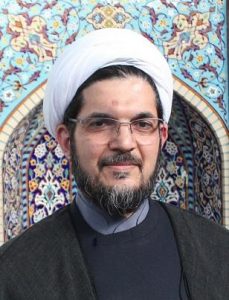
Hojatoleslam Professor Mohammad Hadi Mofatteh was born in 1966 in Qom. He began his primary education in Tehran in 1972, and in 1984 received his diploma in the field of mathemats. He lost his father at the age of 12 and became one of the victims of violence and extremism. His father Ayatollah Dr. Mohammad Mofatteh, a religious scholar and professor at the University of Tehran, was one of the great thinkers who came to the scientific confrontation with any kind of extremism in religion and was martyred by a violent group.
Studying and teaching
Professor Mohammad Hadi Mofatteh has got 7th place in national university entrance exam in 1984 in field of mathmatics. He began his studies in electrical engineering at the Faculty of Engineering of University of Tehran and in 1990 received his degree in field of electrical engineering from this university. He studied his master program in the Quran and Hadith science at the Usul Al Deen College of Qom from 1996 to 2000 using the professors such as Allameh Sayyed Murtaza Asgari and Ayatollah Mohammad Hadi Marefat, and studied in the period from 2003 to 2008 his Ph.D. in Quran and Hadith science at Usul Al Deen College using lecturers such as Dr. Seyyed Mohammad Baqir Hojati and Ayatollah Marefat. His doctoral thesis titled “Power Theory deriving from the Quran and tradition” and was selected as the best doctorate dissertation at the 17th International Quran Exhibition.
Hojatoleslam Professor Mohammad Hadi Mofatteh studied high schools and colleges and at the same time attended to the courses in Tehran’s seminary. He also studied in classes of the seminary members such as Seyed Ali Hashemi Golpayegani, Seyyed Hassan Mostafavi, Sayyid Hossein Mostafavi and Dr. Abolghasem Gorgi in the fields of Jurisprudence, Principles, and Philosophy.
He then participated in the seminary of Qom to complete the high level courses of the field with the seminary members such as Sayyid Ali Mohaghegh Damad, Hasanzadeh Amoli, Hasan Ghadiri, Etemadi, Reza Ostadi, and Ali Mohammadi Khorasani. He stayed in Tehran for two years because of the military service and spent lessons on jurisprudence and principles in Tehran’s Seminary with the Great Ayatollahs Seyyed Ali Khamenei and Hajj Aqa Mojtaba Tehrani. After returning to Qom, he learned from the lessons of jurisprudence, the principles and philosophy of the Great Ayatollahs Fazel Lankarani, Shabiri Zanjani, Javadi Amoli, Vahid Khorasani, and Moemen Qomi.
Hojatoleslam Moftteh has taught high levels in the Qom Seminary with several courses in jurisprudence and philosophy, and since the academic year of 2012 he has been teaching outside jurisprudence (highest level in jurisprudence) in the Qom Seminary.
Professor Mohammad Hadi Mofatteh has been promoted to Associate Professor of Quran and Hadith Science since October 2008 and has been promoted to professorship since February 2014. In addition to teaching at this university, he also teachs at Qom Azad University, Religions and theology faculty , Usul Al Deen College, faculty of Quran and Hadith, Imam Khomeini Specialized University, Higher School of Interpretation, Quran University of Science and Education, and Farhangian University at bachelor’s degree, master’s degree and doctorate degrees. So far, the guidance and consultant of the dissertations of Ph.D. and Masters degrees have been numerous for him.
Research and Publications
Professor Mohammad Hadi Mofatteh is the author of several works including:
three books of power theory derived from the Quran and tradition (2009, award winning Book of the Year 2009) the study of the distortion of the Quran (2011) and Orientalism or Islamophobia (2016). He has published numerous articles in domestic and foreign scientific journals, whose titles include: a manifestation of the rule of law in the traditions of the Prophet (2010); the language of the Quran from the perspective of Ghazali (2010); the extent of government interference And jurisprudence from the point of view of the Quran and Nahj al-Balaghah (2011); the place of rational reason in the principles of Shia and Sunni jurisprudence (2013); the verses of the Hajj with an adaptive approach (2014); the lifestyle of the underlying managers (2014); privacy; Social ethics (2014); social activity of women in the opinions of Shia and Sunni commentators based on the verses of 33 surah al-Ahzab and 24 surah Nisa (2015); the scope of freedom of the artist in relation to the privacy of individuals and guilds (2015) Review of the judgment of Akhund Khorasani and Imam Khomeini regarding the validity of the narrations of Mustadrek al-Wasel (2015); the “right to criticize” from the perspective of the Quran and tradition (2015); the feasibility of the implementation of the theory of good governance in Islamic societies (2016); comparative interpretation; Analyzing the verse of Imamat in the interpretation of Sunni and Shia (2016); The Rule of Importance and the Unethical Theory of Justification (2016); The negotiation of Alast and the Criticism of Commentator’s Perspectives on the Verse of the Misagh(2016); The Critique of the Adoption of the Quran from the Literature of the Time, Analyzing the Viewpoint of Yousef Dareh Haddad (2016); The Imam Ali’s Creation and Expansion of Consistency Society, relying on the role of the national media (2016); an interpretative survey on the halalness of marriage with the women of the book (2017);
Assignment and analysis of economic corruption and its economic consequences in Quran and Hadith (February 2016); Ethics in Politics, a Comparison between Machiavelli, Qur’an, and Ali (June, 2016); The Relation of Family and Society in New Models of Communication from Islamic Perspective (July, 2016); The Relationship between Governmental Popularity and its Religious Legitimacy (August, 2016); Transmitters of Hadith of Abu al-Qasim al-Khoei in General Reliability (December, 2016).
Presence in executive positions
Professor Mohammad Hadi Mofatteh, alongside with his academic studies and teaching, has assumed various executive and scientific responsibilities, including:
Member of the Board of Directors and Technical Deputy Computer Research Center of Islamic Sciences (1992-1998), Founder and director of the National Maaref Radio Broadcasting Network (1998-1999), Secretary of the High Council for Religious Affairs of the Voice of the Islamic Republic of Iran (1999-2006), director of the Islamic Economics Department at the Center for Islamic Studies of Iran’s television (2004-2005), Director of the Department of Quran and Hadith science of the University of Qom (2010-2012), Deputy of Education and Research of the Faculty of Theology and Islamic Education of Qom University (2012-2014), Board member of Islamic Azad University, Hamedan Province (2010-2016), representative of the Minister of Science in the Supervisory Board of Islamic scholar of the University of Qom (2015-2018), member of the board of directors of the Qur’anic Studies Association of Qom (2015-2018), member of the elected council and research assistant of the Supreme Council of Qom Islamic Seminary (2016-2018).Hojatoleslam Dr. Mohammad Hadi Mofatteh from September 2018, at the age of 51, as the representative of the Shi’ite authority, took over the responsibility of the Islamic Center of Hamburg and the imamate of the Hamburg mosque
Hojatoleslam Professor Mohammad Hadi Mofatteh from September 2018, at the age of 51, as the
representative of the Shi ite authority, took over the responsibility of the Islamic Center of Hamburg and the imamate of the Hamburg mosque.
Hojat Al-Islam Muhammad Mohagheghi
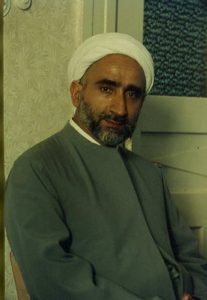 the first Imam of the mosque in 1289 SH, was born in Lahijan Town. After he finished his studies at elementary school in Rasht, he moved to Tehran in order that he could continue his studies. He continued his studies in new sciences in Dar-Alfonun and Kamalolmolk schools as well as learned French and Russian Languages. Furthermore, he finished the elementary level Arabic Literature in Marvi school in Tehran.
the first Imam of the mosque in 1289 SH, was born in Lahijan Town. After he finished his studies at elementary school in Rasht, he moved to Tehran in order that he could continue his studies. He continued his studies in new sciences in Dar-Alfonun and Kamalolmolk schools as well as learned French and Russian Languages. Furthermore, he finished the elementary level Arabic Literature in Marvi school in Tehran.
Late Mohagheghei moved to Mashhad so that he could continue his studies and learned the theological sciences there. As he was studying the theological sciences, he started teaching maths in Mashhad. Afterwards, he moved to Qom and started learning the advanced levels of the theological sciences. He also taught the science of committee, physics and other natural sciences.
He was sent to Tehran in 1330 S.H and by the order of Ayatollah Boroujerdi, he moved to Germany in 1334. He was involved in various activities at the mosque and stayed for about 10 years.
During this time, the foundation of the Imam Ali Mosque was laid in Hamburg. Half of the mosque’s building was built under his control and then the activities of the mosque started.
Late Mohagheghi returned to Qom after Ayatollah Boroujerdi passed away and he started teaching in the theological school of Qom once more. He passed away at the age of 59 in Qom in 1348 S.H.
Ayatollah Dr. Seyed Muhammad Husseini Beheshti
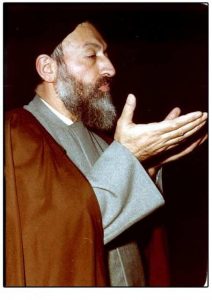 was born in Isfahan in 1307 SH. and started his studies at the age of 4 there. He finished his elementary and high school studies in Isfahan. Then he started learning religious sciences, and finished the studies of the Islamic sciences in the scientific schools in Isfahan.
was born in Isfahan in 1307 SH. and started his studies at the age of 4 there. He finished his elementary and high school studies in Isfahan. Then he started learning religious sciences, and finished the studies of the Islamic sciences in the scientific schools in Isfahan.
He also started learning English whilst he was studying religious sciences. He moved to Qom so that he could continue his studies and learned courses outside the highest levels of education in the Islamic jurisprudence in the presence of some great instructors such as Ayatollah Boroujerdi, Ayatollah Mohaghegh Damad, Imam Khomeini and Ayatollah Seyed Muhammad Taghi Khonsari.
He followed his studies in new sciences and was accepted in Tehran University. He succeeded to acquire a Ph.D. degree in theology and Islamic education. He learned philosophy from late Allama Tabatabaei for five years in Qom and at the same time, he taught English in the high schools of this city.
Along with his friends he established the school called religion and knowledge and founded the Islamic club of students and the educated people of Qom in 1333 S.H. He had to leave Qom because of the pressure of the government in 1340 and 1341 and moved to Tehran. Apart from religious activities, he and some of the elites had an active role in rewriting the theology books of the schools in Tehran.
He was sent to Hamburg in 1344 S.H and was appointed as the second Imam of the mosque and the director of the Islamic centre in Hamburg. He undertook this responsibility for about six years.
During this time, the Islamic centre of Hamburg was considered as a hub for the Islamic cultural scientific activities for all of the Muslims and it presented extended activities to introduce the Islamic teachings to Muslims and non-Muslim residents of Europe. Ayatollah Beheshti had an active role in forming Islamic organisations related to university students in Europe, creating links with the academic centres of Germany and in engaging in interfaith dialogue. He returned to Iran in 1349 and in addition to the extended intellectual academic activities, he started compiling theological books. He was arrested by the regime in 1354 and 1357 and was imprisoned for a while.
When the council of the revolution was formed by Imam Khomeini, he was selected as the member of this council and had an active and effective role there.
After the victory of the revolution, in the early days, he alongside others established the Islamic Republic party and he was appointed as secretary-general.
When the assembly of constitution was formed, he was selected as its member by people and appointed as the chief assistant of this assembly. Afterwards, he was appointed as the chairman of the judiciary branch and Supreme Court of the country. He andseventy two ministers; the representatives of the parliament and other officials of the Islamic revolution were martyred by a terrorist group on Tir seventh in 1360 S.H. Ayatollah Beheshti has written extensively on subjects such as philosophy, theosophy, jurisprudence and Islamic economy.
Hojat Al-Islam Mohammad Mojtahed Shabestary
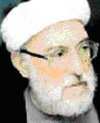 was born in Shabestar, one of cities in Azerbaijan Sharghi Province, in 1315 SH. He completed elementary school in Tabriz. He moved to Qom in order to study theological sciences and lived there for 17 years. Apart from studying, teaching theological sciences and preaching during these years, he wrote some articles for the magazine the school of Islam . Late Ayatollah Dr Beheshti appointed him as the assistant of the Islamic centre of Hamburg in Germany in 1348 SH and he cooperated with the late Ayatullah Beheshti there for a year. After Ayatollah Beheshti went back to Iran, Mr Shabestari took the responsibility of being the Imam and managing the Islamic Centre of Hamburg for seven years and six months.
was born in Shabestar, one of cities in Azerbaijan Sharghi Province, in 1315 SH. He completed elementary school in Tabriz. He moved to Qom in order to study theological sciences and lived there for 17 years. Apart from studying, teaching theological sciences and preaching during these years, he wrote some articles for the magazine the school of Islam . Late Ayatollah Dr Beheshti appointed him as the assistant of the Islamic centre of Hamburg in Germany in 1348 SH and he cooperated with the late Ayatullah Beheshti there for a year. After Ayatollah Beheshti went back to Iran, Mr Shabestari took the responsibility of being the Imam and managing the Islamic Centre of Hamburg for seven years and six months.
During this time, apart from the completion of a lot of outstanding works of the building of the mosque, he was doing the cultural scientific activities and participation in common interfaith dialogues. He returned to Iran in 1356 and he was appointed as the representative of the Islamic parliament by the people after the victory of Islamic revolution. Afterwards, he was appointed by the faculty of Tehran University and he was teaching as a prominent professor in the majors of Islamic theosophy, the philosophy of religion and history of religions in the theology college.
Presently, apart from teaching and doing research in Tehran University, he is the attendant of the theosophy group in the Islamic great encyclopedia. Shabestari has written some articles and books about new theosophy and hermeneutics that are the focus of attention in scientific and academic assemblies.
Hojat Al-Islam Seyed Muhammad Khatami
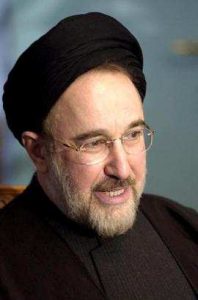 Hojat Al-Islam Seyed Muhammad Khatami, was born in Ardakan in the province of Yazd in 1322 S.H. he finished elementary school and middle school in Ardakan and in 1340 S.H and moved to Qom to undertake Islamic studies.
Hojat Al-Islam Seyed Muhammad Khatami, was born in Ardakan in the province of Yazd in 1322 S.H. he finished elementary school and middle school in Ardakan and in 1340 S.H and moved to Qom to undertake Islamic studies.
Whilst finishing the advanced levels in the theological school in Qom, he was simultaneously studying philosophy in Isfahan University. After he achieved a BA, he continued his studies and completed his MA in training sciences. Then he came back to Qom again and studied philosophy and Islamic theosophy apart from jurisprudence and principles of jurisprudence.
Hojat Al-Islam Muhammad Khatami, along with other clergymen participated in the political fights between 1350 and 1357.
He moved to Hamburg in 1357 according to the suggestion of late Ayatollah Beheshti and the acceptance of religious authorities and undertook the responsibility of the mosque. Whilst he was there, the Islamic centre became an active religious and cultural base in Europe
Hojat Al-Islam Muhammad Khatami, was appointed as the representative of the first period of Islamic council parliament at the end of 1358 and came back to Iran in Khordad Month of 1359. He undertook the responsibility of Keihan Institute in Aban Month of 1359 and was appointed as the minister of Culture and Islamic guide in the fall of 1361. During this time, he undertook the responsibility of the member of supreme council of the Cultural Revolution, the presidency of public culture council of the country and the presidency of the council of language expansion and Persian Literature.
He worked in this ministry building for ten years and abdicated it in 1371. Afterwards, he was appointed as the consultant of the president, the attendant of national library of Iran and the boss of the public libraries in the country and at the same time, he was teaching advanced levels at university in the majors of theosophy and the political idea of Islam.
He was appointed as the president of Islamic Iran by people in 1376 and in his presidency period, he came up to an idea debate among civilisations , that was warmly welcomed by the international society with the purpose of peaceful ruling rather than war among civilisations .
Mr. Khatami wrote different books about different topics in Islam and some of them have been translated to other languages.
Hojat Al-Islam Muhammad Moghadam
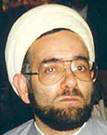 was born in Qom in 1330 H.S. He completed his at elementary school there. Afterwards, he entered the theological school in order to study the religious sciences and during this time, he was studying jurisprudence, doctrines and philosophy.
was born in Qom in 1330 H.S. He completed his at elementary school there. Afterwards, he entered the theological school in order to study the religious sciences and during this time, he was studying jurisprudence, doctrines and philosophy.
He was arrested by Savak in 1357 whilst giving sermons in the mosques,and held in prison. Mr. Moghadam undertook different responsibilities after the victory of the Islamic revolution. Afterwards, he was appointed as the Imam of the Mosque and the manager of the Islamic centre of Hamburg following the suggestion of late Shahid Beheshti and worked here for twelve years. This period was one of the most successful phases at the centre.
His activities during his time in office included the establishment of classes teaching Persian Language for children, the publication of the German magazine Zaban Al-Fajr , the publication of children books, writing pamphlets with regard to the introduction of Islamic topics in German, the expansion of communication with the German speaking community, interfaith work, holding various seminars and conferences in the centre, taking part in academic assemblies, the presentation of the topic in Persian, Arab and German Languages, holding educational seminars for university students, rebuilding of the mosque and the completion of other parts of the building.
Hojat Al-Islam Moghadam, returned to Iran in 1371 and at present, he is doing academic, cultural and religious activities in Tehran.
Hojat Al-Islam Muhammad Bagher Ansari
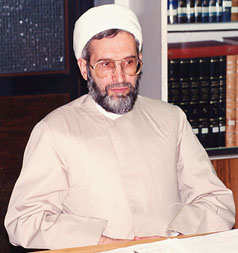 was born in Mahalat. He started his elementary school there and in 1337 he started learning the religious sciences at the theological school. At the same time, he started learning new sciences in the high schools of this city. In addition to learning religious sciences, he started learning English, Russian, German and Arabic and in 1348 S.H he published his first work, translating a book from Arabic to Farsi. He studied jurisprudence, theology and philosophy for twelve years.
was born in Mahalat. He started his elementary school there and in 1337 he started learning the religious sciences at the theological school. At the same time, he started learning new sciences in the high schools of this city. In addition to learning religious sciences, he started learning English, Russian, German and Arabic and in 1348 S.H he published his first work, translating a book from Arabic to Farsi. He studied jurisprudence, theology and philosophy for twelve years.
In 1350 S.H, he was the member of a three-person group for research under the supervision of Ayatollah Beheshti and was doing research in the areas of: Qur’anic interpretation, Islamic and western philosophy and the analysis of religions such as Christianity. At the same time, he translated a book about the beliefs of religions and Christian sects from English to Farsi.
In 1351 S.H, he founded the office of Islamic international communications in Qom and had extended communications with the Islamic scientific cultural centres all over the world.
After the victory of Islamic revolution, Mr. Ansari undertook different responsibilities in cultural and preaching institutes and accepted the responsibility of the magazine ECHO OF ISLAM .
From 1361 S.H he worked as an assistant in the organisation of Islamic preaching for ten years and was also chief editor of English newspaper Tehran times . Since he wanted to expand the Islamic trainings and to get familiar with the culture of Muslim people in different regions, he had different research travels to those areas.
Hojat Al-IslamAnsari, was appointed as the sixth Imam and the manager of the Islamic centre of Hamburg in 1471 and undertook this responsibility for seven years until 1378 and at the present time, he is doing academic and religious activities. Mr. Ansari has written various articles in different areas of Islamic studies and has carried out research on Christianity.
Hojat Al-Islam Seyed Reza Hosseini Nasab
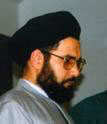 was born in Yazd in 1960 S.H. He left the public high school at the age of sixteen in order to learn theological sciences in the theological school in Qom. He knew Arabic, Persian and English Languages well and spoke them fluently. The Muslims of Canada invited him to Toronto and he was fulfilling religious activities for four years. During this time, he established four Islamic important institutes the Islamic centre of Valiasr in Toronto, the assembly of Ahle Beit in northern America, the centre of Ahle Beit in Ottawa and the educational institute in Ottawa . Additionally, he founded two magazines the right path in English and Nistan in Persian.
was born in Yazd in 1960 S.H. He left the public high school at the age of sixteen in order to learn theological sciences in the theological school in Qom. He knew Arabic, Persian and English Languages well and spoke them fluently. The Muslims of Canada invited him to Toronto and he was fulfilling religious activities for four years. During this time, he established four Islamic important institutes the Islamic centre of Valiasr in Toronto, the assembly of Ahle Beit in northern America, the centre of Ahle Beit in Ottawa and the educational institute in Ottawa . Additionally, he founded two magazines the right path in English and Nistan in Persian.
He undertook the responsibility of the management of Islamic centre of Hamburg and the Imam of the Mosque Imam Ali from the beginning of 1999 until 2003.
Ayatollah Seyed Abas Ghaem Maghami
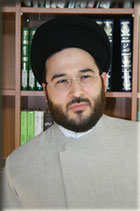 was born in Tehran and in a family known as only the elite and good – natured politician in his era, Mirza Seyed Abu Al-Ghasem Ghaem Maghami. His father is the grandson of Ghaem Maghem whose lineage goes back tomartyr Sadr Azam through four mediates and the ancestry of Ghaem Magham leads to Hazrat Imam Zaine Al Abidin peace be upon him through thirty four mediates.
was born in Tehran and in a family known as only the elite and good – natured politician in his era, Mirza Seyed Abu Al-Ghasem Ghaem Maghami. His father is the grandson of Ghaem Maghem whose lineage goes back tomartyr Sadr Azam through four mediates and the ancestry of Ghaem Magham leads to Hazrat Imam Zaine Al Abidin peace be upon him through thirty four mediates.
Ghaem Maghami started learning religious sciences in the theological school of Tehran from the early years of official education and over several years, he benefited from the presence of prominent and great masters of theological schools of Qom and Tehran in the field of jurisprudence, philosophy, and theosophy and achieved the degree of Ijtihad deducing edicts from Quran and Hadith in the early years of his youth.
In addition to the courses of theological school, Ghaem Maghami started learning and studying the new philosophy and the philosophy of policy seriously. Apart from teaching jurisprudence, principles of jurisprudence and philosophy in the theological school, he as an assistant professor taught Islamic philosophy, Islamic Gnosticism of the foundations of jurisprudence, Islamic rights, political thought and comparative theosophy in different universities of Tehran and he was invited to teach advanced levels in the courses of Gnosticism and theology by the department of oriental studies in the Berkeley University of America. Some of his ideas that include the clarification of legitimacy interference of human wisdom in the process of religious rules deduction, discrimination between subjective legitimacy reality and objective discrimination the emphasis on the latter one in the political ruling , the criticism of the methodology of Ijtihad on the basis of the world recognition and they have been presented and analysed in the works of Ghaem Maghami
Analysing the book the region of Al-Feragh ; a pattern about the religion on the basis of accepted foundation about Ijtihad and technical principles was presented in the sequence of articles of Maghami published in 1368.
The book jurisprudence searches that include a collection of the ideas of jurisprudence was selected as the book of the year in the field.
Over a hundred books and articles about different topics of philosophy, gnosticism, rights and jurisprudence have been published. The books related to power and legitimacy, the trip of love, philosophical thoughts, endless pain and the introduction to the Quran are the examples of some of his books.
Mr. Ghaem Maghami is one of the youngest Mojtahed that took part in parliament as one of the jurisprudents of Iran. He was working as the Imam and the manager of the Islamic centre of Hamburg and the head of Islamic academy of Germany from 2004 until 2009.
With the selection of the members of European Union of scientists and Shia Tvlvg.hay IEUS , he was appointed as the head of the union in 2009 and with the establishment of the first parliament of the Shia’s in Germany and with the vote of most of the attendants and the officials of the centres in the Islamic mosques of Shia’s in Germany in 2009.
Ayatullah Reza Ramezani
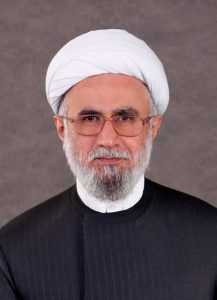 was born in a religious family in Rasht, North of Iran in 1342 S.H. In 1357 besides learning classical subjects, he continued religious and theological lessons informally. In 1359, he formally commenced his preliminary lessons at the Islamic seminary in Rasht under the guidance of the scholars in Rasht. In 1362, he then moved to the holy city of Mashhad to continue his education and passed the highest levels of education under the supervision of honourable scholars including Ayatollah Sabzevari, Salehi, Saeedi, Rezazadeh and Morazavi and he also took part in the philosophy classes of the great philosopher, Seyyed Jalal Ashtiani. In 1367, being interested in continuing his higher education and passing the course of Ijtihad, Professor Ramezani moved to Qom, the city of knowledge and Ijtihad and he benefited from the lessons of theosophy, Fiqh and Principles taught by honourable scholars including Ayatollah Fazel Lankarani, Vahid Khorasani, Makarem Shirazi, Jafar Sobhani, Bahjat Foomani, Madadi Khorasanin for 14 years. Being interested in Quranic studies, philosophy, ethics and mysticism, he took the lessons taught by honourable scholars including Allemeh Javadi Amoli, Allameh Hassan Zadeh Amoli, Ansari Shirazi, Haki Askari Gilani, Marefat and Dr. Ahmad Beheshti for 14 years. After taking part in theological exams and completing his thesis, Ayatullah Ramezani received all the theological degrees from level 1 to level 4 considered as the doctorate degree . In 1384, , he was accepted with a high degree in Ijtihad. Besides theological education, he has also completed his academic education and was awarded with a PhD. His skilfulness in explaining scientific subjects led him to teach and spread the Islamic literature and also taught subjects such as Arabic grammar, logic, philosophy, theosophy, mystics, ethics, interpretation of Qur’an , Fiqh and Principles of jurisprudence at all levels from beginners to higher level at Islamic seminaries in Rasht, Mashhad, Qom and Karaj. Besides teaching at Islamic seminaries, he was engaged in teaching ethical courses, Hadith sciences, Persian mysticism and literature texts, the history of Islam, Islamic theosophy, new theosophy, Methodology, Interpretation and Fiqh Principles of jurisprudence at different universities. His other scientific works can be referred to as the establishment of the first research institute in the field of research on ethics called “the Institute of Religion and Ethics” in 1379; a member and evaluator in the field of philosophical and theosophy of Quran encyclopaedia; a specialist in the field of Islamic sciences at different TV and Radio programs, an evaluator of the best books of Islamic seminary, supervisor and advisor of seminary and university theses at both masters and PhD levels, taking part and lecturing at universities inside and outside of the country and a member of the scientific group of Islamic thought and culture research centre from 1381 until now. With regard to authorship, he has published numerous books and articles in different fields such as Quran, Fiqh, Hadith, mysticism, ethics, law and social, cultural and historical areas. Some of his books are named here: Studying human beingsAn introduction to divine names from the Quranic and mystic viewpointThe issue of relationships in religious ethicsReligious pathological analysis of the movement of AshuraKnowledge acquisition and epistemology explaining visual hadith Faithfulness and believing in faith in the movement of Ashura in Arab language Ethics and mysticismAn introduction to the essentials of BotanyReligious culture making in the movement of AshuraA couple of Quranic investigations a collection of articles Mystics a collection of articles The rituals of Friday a collection of articles A reflection of a convention on removing female discriminationThe life blast and rejuvenated lifeReforming role of AshuraThe call of Friday, the sermons of Friday prayer in KarajThe ethical viewpoints of Allameh TabatabaeeAn introduction to ethical and legal system of a family It is worth noting that a couple of his books and articles have been translated into English, Germany, Turkish, Arabic and Malay languages and received great attention. Ayatollah Ramezani was responsible for managing Imam Ali Islamic Centre at Vienna for three years. Later on, from 10/2/88 30th April 2002 , he was appointed as the Imam and director of Hamburg Islamic Centre and Shia representative in Hamburg to perform cultural and religious activities. On 6th October 2012 and at the second meeting of universal Union of Shias in Germany Ayatullah Ramezani was unanimously elected as the boards head of scholars’ to supervise and referee this union.
was born in a religious family in Rasht, North of Iran in 1342 S.H. In 1357 besides learning classical subjects, he continued religious and theological lessons informally. In 1359, he formally commenced his preliminary lessons at the Islamic seminary in Rasht under the guidance of the scholars in Rasht. In 1362, he then moved to the holy city of Mashhad to continue his education and passed the highest levels of education under the supervision of honourable scholars including Ayatollah Sabzevari, Salehi, Saeedi, Rezazadeh and Morazavi and he also took part in the philosophy classes of the great philosopher, Seyyed Jalal Ashtiani. In 1367, being interested in continuing his higher education and passing the course of Ijtihad, Professor Ramezani moved to Qom, the city of knowledge and Ijtihad and he benefited from the lessons of theosophy, Fiqh and Principles taught by honourable scholars including Ayatollah Fazel Lankarani, Vahid Khorasani, Makarem Shirazi, Jafar Sobhani, Bahjat Foomani, Madadi Khorasanin for 14 years. Being interested in Quranic studies, philosophy, ethics and mysticism, he took the lessons taught by honourable scholars including Allemeh Javadi Amoli, Allameh Hassan Zadeh Amoli, Ansari Shirazi, Haki Askari Gilani, Marefat and Dr. Ahmad Beheshti for 14 years. After taking part in theological exams and completing his thesis, Ayatullah Ramezani received all the theological degrees from level 1 to level 4 considered as the doctorate degree . In 1384, , he was accepted with a high degree in Ijtihad. Besides theological education, he has also completed his academic education and was awarded with a PhD. His skilfulness in explaining scientific subjects led him to teach and spread the Islamic literature and also taught subjects such as Arabic grammar, logic, philosophy, theosophy, mystics, ethics, interpretation of Qur’an , Fiqh and Principles of jurisprudence at all levels from beginners to higher level at Islamic seminaries in Rasht, Mashhad, Qom and Karaj. Besides teaching at Islamic seminaries, he was engaged in teaching ethical courses, Hadith sciences, Persian mysticism and literature texts, the history of Islam, Islamic theosophy, new theosophy, Methodology, Interpretation and Fiqh Principles of jurisprudence at different universities. His other scientific works can be referred to as the establishment of the first research institute in the field of research on ethics called “the Institute of Religion and Ethics” in 1379; a member and evaluator in the field of philosophical and theosophy of Quran encyclopaedia; a specialist in the field of Islamic sciences at different TV and Radio programs, an evaluator of the best books of Islamic seminary, supervisor and advisor of seminary and university theses at both masters and PhD levels, taking part and lecturing at universities inside and outside of the country and a member of the scientific group of Islamic thought and culture research centre from 1381 until now. With regard to authorship, he has published numerous books and articles in different fields such as Quran, Fiqh, Hadith, mysticism, ethics, law and social, cultural and historical areas. Some of his books are named here: Studying human beingsAn introduction to divine names from the Quranic and mystic viewpointThe issue of relationships in religious ethicsReligious pathological analysis of the movement of AshuraKnowledge acquisition and epistemology explaining visual hadith Faithfulness and believing in faith in the movement of Ashura in Arab language Ethics and mysticismAn introduction to the essentials of BotanyReligious culture making in the movement of AshuraA couple of Quranic investigations a collection of articles Mystics a collection of articles The rituals of Friday a collection of articles A reflection of a convention on removing female discriminationThe life blast and rejuvenated lifeReforming role of AshuraThe call of Friday, the sermons of Friday prayer in KarajThe ethical viewpoints of Allameh TabatabaeeAn introduction to ethical and legal system of a family It is worth noting that a couple of his books and articles have been translated into English, Germany, Turkish, Arabic and Malay languages and received great attention. Ayatollah Ramezani was responsible for managing Imam Ali Islamic Centre at Vienna for three years. Later on, from 10/2/88 30th April 2002 , he was appointed as the Imam and director of Hamburg Islamic Centre and Shia representative in Hamburg to perform cultural and religious activities. On 6th October 2012 and at the second meeting of universal Union of Shias in Germany Ayatullah Ramezani was unanimously elected as the boards head of scholars’ to supervise and referee this union.